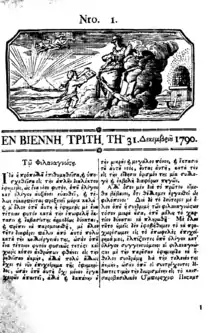Markides Pouliou brothers
The Markides Pouliou brothers (also Markides Poulios, Markidis Pouliou, Markidis Poulios or Marcu Puiu; Greek: Αδερφοί Μαρκίδες Πούλιου, Μαρκίδης Πούλιου or Μαρκίδης Πούλιος), Georgios and Poulios (also Poublios; Greek: Γεώργιος and Πούλιος or Πούπλιος),[1] were two typographers in the Habsburg monarchy. They were ethnic Aromanians[2][3][4] and were the sons of a merchant from Siatista (then in the Ottoman Empire and now in Greece), with them having also been merchants themselves.[1]

The Markides Pouliou brothers worked for Joseph von Baumeister, an Austrian lawyer who founded a printing house at his office in Vienna. On 31 December 1790, the brothers published the first issue of Efimeris, the oldest Greek-language newspaper of which copies are still preserved. After Baumeister was appointed teacher at the Austrian Royal Court in 1792, the Markides Pouliou took the direction of his printing house. During the following years, the brothers continued the publication of Efimeris and obtained Austrian citizenship.[5]
In October 1797, the printing house of the Markides Pouliou published 3,000 copies of a manifesto written by the revolutionary Rigas Feraios. It contained a declaration of the rights of man, a Greek constitution, a proclamation and a call to arms to the Balkan Christians to fight for their freedom[6] against Ottoman rule. In December 1797, Feraios was assassinated by order of the Austrian authorities. The Markides Pouliou brothers were accused with having helped Feraios spread his revolutionary message, and in February 1798, their printing house was closed and they were expelled from the domains of the Habsburg monarchy; they were left alive because of the fact that they were Austrian citizens.[7] The last issue of Efimeris was thus published in 1797.[8]
Apart from Efimeris, the first Serbian-language newspaper Serbskija novini[9] and the first Aromanian-language primer written by Posen-based Aromanian protopope Constantin Ucuta were also published in the publishing house of the Markides Pouliou brothers.[4]
References
Citations
- Pizanias 2020, p. 438.
- Berciu-Drăghicescu 2006, p. 237.
- Dahmen 1987, p. 42.
- Peyfuss 1994, p. 24.
- Mastoridis 1999, pp. 78–79.
- Önsoy 2005, p. 72.
- Mastoridis 1999, p. 86.
- Mastoridis 1999, p. 81.
- Puci 2021, p. 5.
Bibliography
- Berciu-Drăghicescu, Adina (2006). "Școli și biserici românești din Peninsula Balcanică (1864-1948)". Studii de Biblioteconomie și Știința Informării (in Romanian) (9–10): 208–241.
- Dahmen, Wolfgang (1987). "Latein und Romanisch und die Versuche zur Verschriftung des Aromunischen zu Anfang des 19. Jahrhundert". In Dahmen, Wolfgang; Holtus, Günter; Kramer, Johannes; Metzeltin, Michael (eds.). Latein und Romanisch: Romanistisches Kolloquium I. Tübinger Beiträge zur Linguistik (in German). Vol. 308. Gunter Narr Verlag. pp. 40–52. ISBN 9783878087007.
- Mastoridis, Klimis (1999). "Ephemeris and the first steps of the Greek Press". Hyphen, a typographic forum. 1 (3): 71–87.
- Önsoy, Murat (2005). Modern Greek Enlightenment and 19th Century Greek Nationalism (Thesis). Bilkent University.
- Peyfuss, Max Demeter (1994). Chestiunea aromânească: evoluția ei de la origini până la pacea de la București (1913) și poziția Austro-Ungariei. Colecția "Biblioteca enciclopedică de istorie a României" (in Romanian). Editura enciclopedică. ISBN 9789734500734.
- Pizanias, Petros T. (2020). The Making of the Modern Greeks: 1400-1820. Cambridge Scholars Publishing. ISBN 9781527562486.
- Puci, Joana (2021). Die ersten serbischen und griechischen Zeitschriften: Kulturelle und sprachliche Zusammenhänge der Aufklärung (Thesis). Opera Slavica Coloniensia (in German). Vol. 19. University of Cologne.